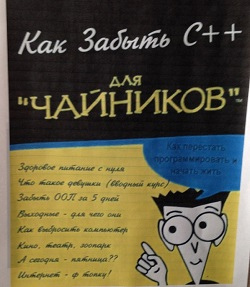Picking analysis, balalaika, divine - and how do you talk with colleagues?
 Sooner or later, your own slang will form in any team. The same, probably, consists of 90% of the words that are more or less clear to any other developer company, especially in the context. And by 10% - from the features of the functionality of the developed product or a specific developer.
Sooner or later, your own slang will form in any team. The same, probably, consists of 90% of the words that are more or less clear to any other developer company, especially in the context. And by 10% - from the features of the functionality of the developed product or a specific developer. Under the cut is a professional dictionary of Parallels developers. And what kind of catchphrases do you have in your team?
-1 is 0, and 0 is infinity - a philosophical comment in the code explaining the interpretation of the possible values of the variable. It is used when the cause of the problem in the product is not clear at all, but it needs to be solved.
Anbazarabl - no problem.It arises from a combination of two expressions - “without a bazaar” and the English prefix un. It is usually used if you can do something quite quickly, and without straining.
 Balalaika is the internal name for Parallels Desktop for Mac, which has come to be short for spoken language. Now you will understand why, in particular, in the 7th version of Parallels Desktop the Easter egg is associated with a song performed on a balalaika and an image of this wonderful tool. Here then there is a video of the Easter eggs. The balalaika standard was exhibited in the office of Andrey Omelyanchuk, development director.
Balalaika is the internal name for Parallels Desktop for Mac, which has come to be short for spoken language. Now you will understand why, in particular, in the 7th version of Parallels Desktop the Easter egg is associated with a song performed on a balalaika and an image of this wonderful tool. Here then there is a video of the Easter eggs. The balalaika standard was exhibited in the office of Andrey Omelyanchuk, development director. Balalaika Schrödinger- the hero of a seemingly paradoxical thought experiment proposed by E. Schrodinger, when he wanted to show the incompleteness of quantum mechanics in the transition from subatomic systems to macroscopic. The experiment is as follows:
Windows 2000 / XP is launched in the development balalaika. The balalaika collapses.
 According to quantum mechanics, if no observations are made on a balalaika, then its state is described by a superposition (mixture) of two states - a working Windows and a Windows that fell into the BSOD, therefore, the Windows running in the balalaika both works and fell into the BSOD at the same time. If the balalaika is expanded, then the experimenter is obliged to see only one specific state - “Windows is running” or “Windows has fallen into the BSOD”.
According to quantum mechanics, if no observations are made on a balalaika, then its state is described by a superposition (mixture) of two states - a working Windows and a Windows that fell into the BSOD, therefore, the Windows running in the balalaika both works and fell into the BSOD at the same time. If the balalaika is expanded, then the experimenter is obliged to see only one specific state - “Windows is running” or “Windows has fallen into the BSOD”.  Balush- The summer corporate party of the company in Novosibirsk. Usually it takes place on a grand scale and goes to the nature of Siberia and Altai, and gathers several hundred people from all over the world. The name comes from the name of the pioneer camp "Balush", where in the middle of the two thousandth the first such corporate parties took place. Now the geography of trips has expanded, and this is not at all pioneer camps, but the name stuck.
Balush- The summer corporate party of the company in Novosibirsk. Usually it takes place on a grand scale and goes to the nature of Siberia and Altai, and gathers several hundred people from all over the world. The name comes from the name of the pioneer camp "Balush", where in the middle of the two thousandth the first such corporate parties took place. Now the geography of trips has expanded, and this is not at all pioneer camps, but the name stuck. Bozena is a drop-dead bug in terms of beauty and size. It arose during the period of overwhelming popularity of the celebrity-warrior Bozena Rynska.
Bucket - the core of the operating system (rebuild bucket, bucket call, bucket debugger). The roots of the word go to the bowels of the VAZ 21083, bought by Mikhail Sibiryakov, who, like a real Linuxoid, before driving a car, decided to rebuild it with new parameters.
To encourage the code is to finish the remaining imperfections.
Uncle / aunt - respectful treatment to male / female colleagues
Fried hosting - type of hosting (from Shared Hosting)
Zhuzhalnitsa - Bugzilla
Saw - implement, implicate
Sprinkle - disable, disable. As in a large number of areas dependent on English vocabulary, this word is derived from the English verb drop - drop, drop, stop.
To litter - to make any GUI element inactive (i.e. without the possibility of selection or pressing). Make it gray, if literally.
Hardcode- it’s hard to write some value into the code, which, according to the idea, should be calculated, but for some reason it is calculated incorrectly, or someone spoils it.
Karlit - develop, develop, program (example: “Throw this bullshit out of the balalaika” = “Please remove this unsuccessful / inefficient code section and / or replace it with another pathos”), as well as simply “do something” ( for example, “I have gone home”). Accordingly, Karl = developer.
 Klizmennaya is one of the meeting rooms at the Parallels Moscow office, where status rallies are held.
Klizmennaya is one of the meeting rooms at the Parallels Moscow office, where status rallies are held. Kovyryany analysis - the study of a problem by the method of "picking" in the code and logs. It is used when the cause of the problem in the product is not clear at all, but it needs to be solved.
Kid- be the cause of a breakdown / problem / bug. The current expression, when the reason is found: "So that's who the kid!".
Blood, guts, wasted - the expression was "donated" by the Plesk testers team and means that an error message appears in the program interface during testing. Such a message not only differs in large print, but also contains the entire stack trace with a description of the error, occupying almost the entire screen.

Curly interface - beautiful, with great functionality. The second value acquired during the work of Sergei Kudryashov, an ex-designer of Parallels Desktop for Mac interfaces, and now a participant in World Usability Day Russia.
20 kg heavier- a way to get out of a bored discussion (or comment on it) in the case when the “heavier” opponent (one of the opponents) is no longer able to objectively constructively, or the subject of discussion is no longer significant. Example: “What are you arguing with him? It’s 20kg heavier anyway. ” Translation: "I hint that the conversation has a chance to go into the phase of assault, and you have no chance due to different weight categories." The source of expression is a joke about a bear, which, in response to the boasting of other forest animals, will promise to all of them to roll a lyule.
Shit - a verb used to indicate actions in relation to the source code repository. It is usually used as a characteristic of making your changes to the repository.
We must kill all the children in the house- DOM - object representation of a web page. Children are children. “Kill all children in the DOM part” - delete all children in a certain part of the web page.
NanoVadim is a unit of labor efficiency that is applicable as a result of the legendary productivity of the developer Vadim Melnikov, who is responsible for the Parallels Business Automation product. One nano-press = 10 to minus 9 degrees of productivity of an ordinary employee.
Not parsed - it is used in the conversation of front-end developers when one of the interlocutors did not understand what the other said. From the programming term “parse” (parse - to parse, analyze) - convert one data to another or convert the data format.
No more malley lucica- the result of the removal of a component or the death of a process.
Finger to nose - a methodology for assessing the readiness of features in a product, gravitating to the limit of rounding. Simply put, a rough estimate. Example: “How many hours will this feature take? “Ten fingers to the nose.” The expression was originally invented by fronted-tim Parallels Plesk.
Pathos - used in relation to something that works well or is positively evaluated by others.
 Pipka is a bulging part of a computer. Usually USB character.
Pipka is a bulging part of a computer. Usually USB character. Orthodox package - was originally born when defining rpm / deb packages in the Plesk Linux team, and then, in principle, it was applied to anything in terms of the “correct”
nail- the code is written in such a way that it is not possible to change the essence “nailed” without serious alterations.
Fart - (eng. PUCC - pick up and call customer) - an expression used in technical support (Novosibirsk) - call the client on his own in response to his request (written) to reduce the time to resolve the problem.
Scripter is a technical support specialist who is responsible for writing scripts (branches of answers to user questions) of call service.
Deadly constipation is an unsuccessful attempt to recursively capture a locked synchronization object, as a result of which there is an infinite expectation of its release. What becomes impossible, because code to no avail trying to capture a locked synchronization object ...
Tabani- intentionally to ignore, not to execute or obstruct the execution of a valuable instruction and / or collective decision adopted and / or the implementation of valuable functionality. It comes from the marine term "banter", used in the meaning of "lower the oars into the water, thus inhibiting the movement of the boat." And it’s also very similar to “ban” (ban - ban).
Aunt Anya is a unit for measuring the number of changes in a version control system. 1 Aunt Anya = 10,000 commits in SVN. Example of use: “Denis uploaded Aunt Ani in SVN 1.4 to get the approval of his superiors, but to no avail. Only the build broke. ” The benchmark for performance, in whose honor the SI unit is named, was Anna Melekhova of Core Team Virtualization, and now also the head of our interns.

The same aunt Anya
Tyranut- get information from its storage device.
Culture Hour is a time when developers courageously try to switch to a normal language. To do this, put on headphones and are sternly silent.
 Stierscheiße is the German equivalent of bullshit. It’s the same: merda del toro (Italian), mierda del toro (Spanish), oushikuso (Japanese), bova merdo (esper.)
Stierscheiße is the German equivalent of bullshit. It’s the same: merda del toro (Italian), mierda del toro (Spanish), oushikuso (Japanese), bova merdo (esper.) Please go ahead and do the needful ' - the manager gives the task to the subordinate, without bothering himself with a clear statement task and extra details - go and make it good. It is actively used in technical support along with other Anglo-Indian pearls. There are even on Wikipedia (http://en.wikipedia.org/wiki/Do_the_needful).
And we decided to take these terms out separately as the most frequently used idioms in the software industry, which are used, of course, in Parallels too:
Hack is a temporary non-system solution. Application Example: Dirty Hack. Translation: “I really do not like this hack. Soon, when there will be refactoring, this hack will become a system solution. ”
A crutch is a piece of code that serves as a patch for something not working. The main difference from the hack is that the hack is a non-universal, temporary solution that works in a limited (but necessarily overwhelming) number of cases, while the crutch is designed to fix some properties of the universal code.
Examples of differences between a hack and a crutch: an array of numbers is given, and it is known that in the overwhelming majority of cases after 2 it will go 3. You need to sort it. If after 2 you always copy the next member, then this is a hack, because it will work in a limited number of cases and the sorting algorithm itself is changed. If you need a sorted array, but for which the largest number and the smallest should be swapped, then after the universal sorting procedure, a crutch is put - a code that exchanges the 0th and Nth elements.

The “pen” is like a crutch: as a rule, it’s just as awkward, and “sticks” with or without. However, unlike the “crutch”, it necessarily “sticks out” in userspace, and therefore it cannot be sawn out not only during refactoring, but in general (especially if it is documented).
Backup- an established term, especially in the Linux kernel programmer environment, which means a temporary or permanent workaround for some kind of problem in the code that is not so easy to fix. It is used mainly in a negative context.
By the way, local-team humor is usually included in folk-software folklore. We plan to make a separate post for him, but for now - a few jokes for the seed. Most of them are already very many years old. They are carefully entered into the annals of our internal Wikipedia, but we decided to extract some of them and share with the readers of Habra.
• You can’t do everything right and right at once, so we’ll do a little and wrong.
• - Big, did you make a notification? - Yes, I got up and said loudly!
• I’ve unearthed a bug here, but I don’t yet know whether it is a bug or not a bug ... P1 team in unison: NOT BAG !!!
• Do you feel like writing a bug in a bugsilla or forget it?
• If the directory is unavailable, this does not mean that it is not protected. On the contrary, she is protected even better!
• Admin can do anything! And that’s all ... and nothing else
• Before you do something through the sleeves, think - maybe it’s better to score at all?
• Not found - no bug!
• I am sitting, that means, at an interview, they ask me - how do you feel about emergency work? And I didn’t know the word at the time ...
• Vadim, here the client wants something strange ... Vadim (not letting him finish): he will be in the next version!
• But the beginning of the ticket was so optimistic: “Hello ...”
• 24x7 support: 24 hours a week, seven months a year
• - Knock-knock-knock. - Who's there? - It's me, the postman Pechkin, brought the magazine - “Bagzilka”.
• Why is a C ++ programmer worse than a syshnik? His errors are polymorphic, encapsulated and inherited.
• Poems from support: “You ask him, ask which version of the axis ...”
• Remember, the boss thinks faster than you! And while you are only considering a good decision, he is already making a bad decision.
• For some reason, this garbage itself worked, we only made those 56 corrections.
• For programmers, strings are formed from spells, while for women, spells are formed from strings.
• I’m thinking of selling a phone because it’s too cool. “Does his intellect overwhelm you?”
• I do not want to seem rude, but ... read the dock!
